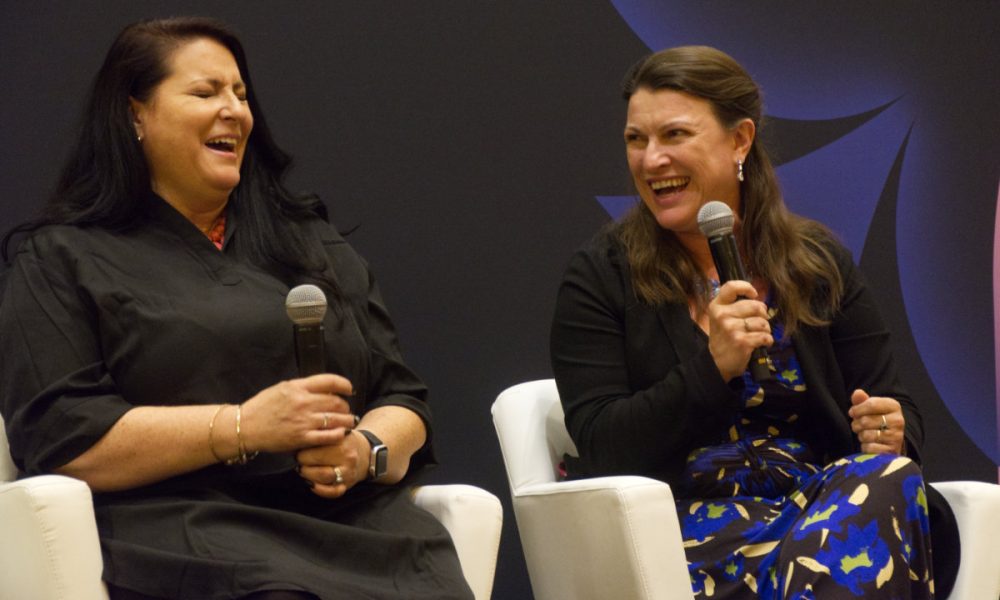The number of female slot players continues to grow in the U.S., but game designers shouldn’t try to appeal to them by use of the color pink or flowers. Instead, they should make games that are fun for everyone to play.
That was the message from a Global Gaming Expo educational session, “How Female Designers Are Influencing Game Design,” moderated by Carolyn Tomcyzyk, senior director of art design at Konami Gaming.
Francine Maric, better known as “Lady Luck HQ” on social media, said that her followers online look for games that are simple and have vitality. “They want to see action. They want to see jackpots,” Maric said.
European game makers, however, haven’t gotten that message, according to Helen Walton, founder and chief commercial officer for G Games in the UK. She said their data shows that 44% of players are female, but it’s a demographic that continues to be ignored by the industry.
“European online casinos have said for years, ‘We have a male player base, men are far more valuable, and we should be catering to them,’” Walton said. “That’s why in Europe, there are Playboy slots and every female character has her (breasts) placed vertically so you can see them and her bottom at the same time. There’s perhaps a circular fallacy if you build slots for men and advertise to men, then you get male players, but the data is starting to get through to people. Online casino-game suppliers are starting to realize the spend of the female audience.”
In social gaming, women already spend more than men, which Walton said is “a bit of a sign” as to looking at why women are spending less on a company’s product, instead of “congratulating yourself on how male you are.” That’s money left on the table, she insisted.
Many in the European gaming industry believed that women were more attracted to bingo and lotteries and that men were online. Walton said walking around properties on the Las Vegas Strip showed her that women love to play slots. And game creators don’t need to try to add the color pink or put a bow on it to make it interesting to women.
“It’s a horrible way to design for your customer and I can’t believe people are still doing it in 2023.”
Walton suggested the audience imagine the reaction if the gaming industry rolled out slot games celebrating pride and the lesbian, gay, and transgender community or Black Lives Matter. “For some reason, that’s what we seem to do with women. It’s just awful.”
Kimberly Cohn, senior director of game design at Light & Wonder, said the lesson for the industry is that it’s important to have games that appeal to everyone.
“Why would you intentionally keep people from playing slots?” Cohn asked. “You want it to be universal. Women don’t want to be pandered to and don’t want something specific like a butterfly game. That can be condescending. Women want something that can make them dream and be entertained. Women know what they like. Ask them. I was so grateful to be one of the only women in game design for a very long time.”
Cohn said it’s important that the industry be sensitive and credits it for maturing with the mix of game design and understanding what players want. “At this point, it’s making games that appeal to everyone.”
While women don’t want sexualized content of the female form whose sole purpose is to attract men, Cohn said women have no problem with some exotic content.
“We had a cartoon version of a Playboy game where a woman popped up and it was funny,” Cohn said. Male executives were worried it would offend people, but it shows that topics can be approached without being offensive.
Walton said the game-creation industry, which wasn’t very welcoming and inclusive in the past, has changed a lot, as more women like herself have become executives.
“Now that we’re starting to become more inclusive, we’re reflecting that in our leadership and customer base,” Walton said. “That’s why you need a role model for the industry you want to create. We want to be the entertainment industry that’s accepted and part of the social fabric of our culture and society. We don’t do that by excluding different groups and looking discriminatory.”



